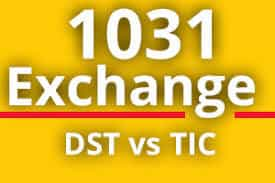Many property owners can realize far greater cash flow on appreciated equity in rental properties that they own. Owners often make the mistake of calculating return on their investment by dividing current rental income by the original investment they made in the property. As an example, suppose you put a 20% down-payment of $40,000 to […]
In this blog, Tax Reporting for 1031 Exchanges, we will summarize required like-kind exchange tax forms and comment further about how the filing date of your taxes may impact your like king exchange time-period. The IRS requires that you complete and file IRS Form 8824 which describes your 1031 Exchange transaction along with your tax return […]
Section 1031 of the Internal Revenue Code (“IRC”) has a very long and somewhat complicated history dating all the way back to 1921. The first income tax code was adopted by the United States Congress in 1918 as part of The Revenue Act of 1918, and did not provide for any type of tax-deferred like-kind […]
Too often we receive calls from rental property owners who have neglected to complete critical steps to execute a successful real estate exit strategy. Regretfully, we encounter many investors who have not fully considered the tax consequences of selling their rental properties. The sale of rental properties and the resulting tax consequences are more complex than the […]
Real Estate Investment Trusts or REITs are one of the most popular forms of real estate investment. REITs have some similarities to DSTs since both are structured as a trust and have in-place management and other features that can cause investors to confuse the differences. REITs, DSTs and triple net properties can be suitable options for […]
Many investors have had bad experiences with TIC investments and are interested in understanding why DSTs may be better. In this blog, we will provide some basic education on the key differences and relative benefits of TIC investments and 1031 DST exchanges. Loan Responsibilities – In a DST the sponsor or an affiliate trustee is the sole borrower and […]
1031 Exchange Properties Guide The origin of 1031 Exchanges dates to 1921 and the related provisions which permit tax deferrals have been extensively used by many taxpayers to save taxes. While specific details have evolved over time, there are basic rules outlined below which apply to almost all 1031 Exchanges and 1031 Exchange Properties Rule #1 – Both […]
Triple net leased properties (NNN) are those where the tenant is responsible for paying for all taxes, insurance, maintenance for the property (the three nets). Triple net properties remain one of the most popular asset classes for real estate investors who are seeking relatively low management responsibilities and stable cash flow. We would like to […]
A common question that investors ask is “what are the sales costs associated with investing in DSTs as compared to traditional real estate?” Selling costs for DSTs (sometimes called “load”) are expressed as a percentage of the total cash or equity that is invested and range from 8% to 12% on average. Selling costs for […]
Many investors who are planning to save taxes via a 1031 Exchange fail to fully follow IRS guidelines and end up with tax liabilities that could be avoided. Let’s review the basic 1031 Exchange rules to understand the steps that must be taken to complete a 100% tax free investment. The same tax payer entity who sells […]











